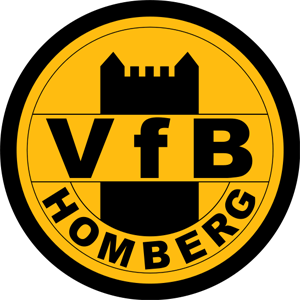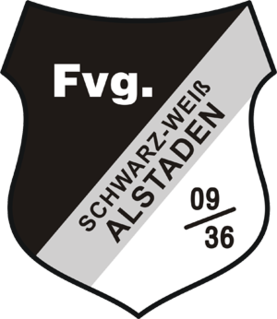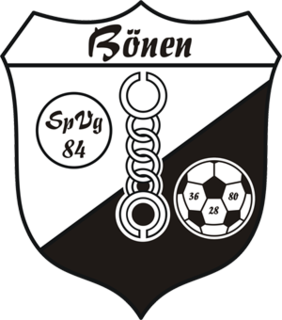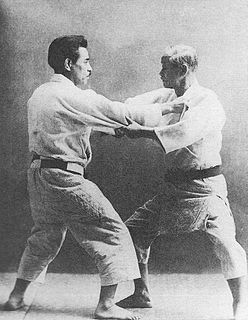
The VfB Homberg is a German association football club from the Homberg quarter of Duisburg, North Rhine-Westphalia. The club was formed July 1969 through the merger of Homberger Spielverein and Sportvereinigung 89/19 Hochheide.

VfB Speldorf is a German association football club from the city of Mülheim an der Ruhr, North Rhine-Westphalia.

VfB Königsberg was a German association football club from the city of Königsberg, East Prussia. The team played its home games at the Sportplatz des Vereins für Bewegungs Spiele near the Maraunenhof Stadtgärtnerei, aside from 1940–41 when they played at the Sportplatz am Friedländer Tor between Haberberg and Rosenau.

Yorck Boyen Insterburg was a German association football club from the city of Insterburg, East Prussia.

VfL Köln was a German association football club from the city of Cologne, North Rhine-Westphalia. The club was formed out of the pre-war merger of Kölner Club für Rasenspiele and Kölner Sportclub 1899, through which it lays claim to being the city's oldest football club.

VfL Benrath is a German association football club from the southern city district of Benrath in Düsseldorf, North Rhine-Westphalia.

TuS Helene Altenessen is a German football club from the district of Altenessen in the city of Essen, North Rhine-Westphalia.

VfB Offenbach is a German association football club from the city of Offenbach am Main, Hesse. Currently playing in the Kreisliga A (IX), the team was a second division side during World War II and appeared for a single season (1943–44) in the Gauliga Hessen-Nassau (I).

VfR Achern is a German football club from the city of Achern, Baden-Württemberg near the Hornisgrinde mountain. The club was established on 17 October 1907 as Fußball-Club Achern and adopted the name Verein für Rasenspiele Achern in 1910.

Schwarz-Weiß Alstaden is a German football club from the city of Oberhausen, North Rhine-Westphalia. The current day club recognizes as its predecessors Fußball-Club Borussia 1909 Alstaden and Verein für Rasenspiele 1936 Alstaden.

SpVg Bönen is a German association football club from Altenbögge in Bönen. The team is the successor to Verein für Leibesübungen Altenbögge which was established 17 May 1928 and played as a first division side during World War II. Almost all the players were workers from the Königsborn III/IV colliery. VfL played attractive attacking football which soon earned them the nickname "Rote Husaren" and a place in second division play by 1937.

BV Altenessen is a German football club from the city of Essen, North Rhine-Westphalia. It was established 6 May 1906 and had short turns as a first division side prior to World War II.
SG Andernach is a German football club from the city of Andernach, Rhineland-Palatinate. The club was formed in 1999 through the merger of the football departments of SpVgg Andernach, BSV 1910 Andernach, and DJK Boulla Andernach based in the earlier association between these sides going back to 1992. SpVgg was the best known of these predecessor sides, having taken part in the first division play in the Gauliga Mittelrhein and Gauliga Moselland under the Third Reich and in the Fußball-Oberliga Rheinland-Pfalz/Saar after World War II.

FC Treptow is a German association football club from the city of Berlin and is the successor to Werkverein der BEWAG Berlin which was established in 1928 as the worker's sports club of the city's electric utility Bewag Aktiengesellschaft.

Lufthansa SG Berlin was a German association football club based in the Schöneberg district of Berlin. It was established in 1931 as the worker's side of the national airline Deutschen Lufthansa Berlin and was active through to the end of World War II.

Pro Sport Berlin 24, formerly Post SV Berlin until 2005, is a German association football club from the city of Berlin. It was formed 29 September 1924 and was one of many the sport clubs established by police and postal workers in the 1920s. Through most of its history the club has been a lower-tier local side.

Stern Breslau was a German association football club from the city of Breslau, Lower Silesia. It was established in 1920 as the workers' club BSG Großmarkhalle Breslau and by 1921 was playing as Sportverein Stern Breslau. It was part of the Arbeiter-Turn- und Sportbund,, a leftist national sports organization which organized a football competition and championship separate from that of the DFB. Stern is notable as the losing side in the 1924 league final where they were beaten by Dresdner SV 10 6:1. This was the first of four consecutive titles for the Dresden club.
BSG Chemie Leipzig was a German football club from the Leutzsch district of Leipzig, Saxony. The prewar identity of the club is rooted in the establishment of Britannia Leipzig in 1899 and its successor TuRa Leipzig. During the socialist era the traditions of the club were continued in the East German teams BSG Chemie Leipzig and SC Lokomotive Leipzig before the emergence of FC Sachsen Leipzig following German reunification, which continued the clubs traditions.
The Western German Cup was a cup competition organised by the Western German Football Association, which was played from the 1949–50 season up to the 1973–74 season. The best teams then qualified for the following season of the DFB-Pokal. In the years 1954 to 1960, only the Western German Cup winner participated in the DFB-Pokal. In the 1954–55 season, there was no competition.






















